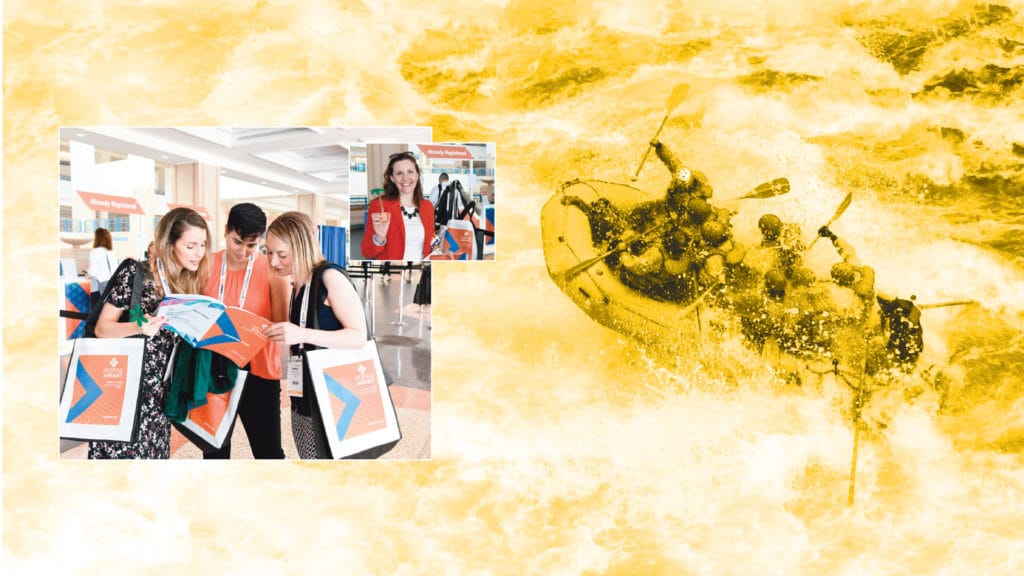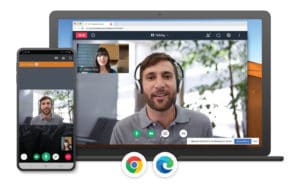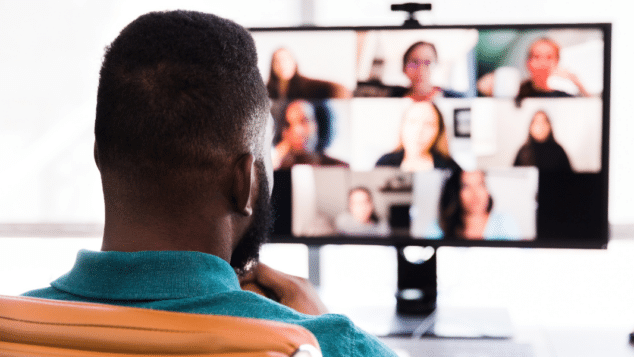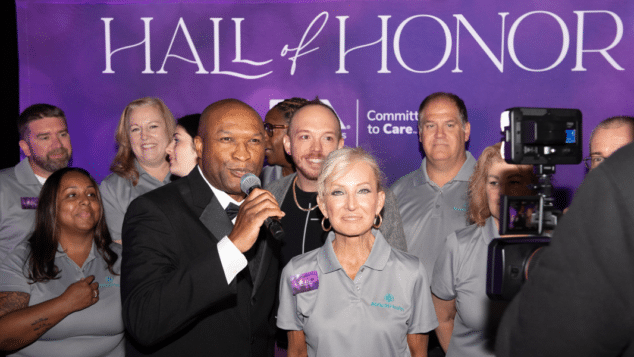Ready for Anything

Theodore Roosevelt may have said it best when he declared, “Do what you can, with what you have, where you are.” These wise words were certainly put into action by the Hematology/Oncology Pharmacy Association (HOPA) earlier this year. Every spring, HOPA hosts its annual conference, HOPA Ahead. As an association of healthcare professionals, we were aware of and monitoring the COVID-19 epidemic long before it hit the United States. What we didn’t anticipate, however, was the sudden, powerful impact it would have on our conference.
The meeting was planned for March 11–14, before a stay-at-home order was issued in Florida. During the course of the four-day meeting, HOPA Ahead 2020 was slated to present 37 educational sessions featuring 78 different speakers. We were on track to have record attendance, with registration numbers approaching 1,300 live and 200 virtual attendees. But, a week and a half before the meeting, the news of a rapidly increasing number of positive COVID-19 test results in the U.S. spurred a chain reaction. Academic institutions, medical centers and pharmaceutical companies began imposing institution-wide travel bans, inhibiting speakers from traveling to Tampa, Florida, for the event. Five days before the conference, 17 of our 78 speakers were affected by travel bans; just three days later, that number had nearly tripled.
So, what do you do when a pandemic wreaks havoc on your event just days before it begins?
Cry?
Panic?
Roll up your sleeves, and just “figure it out”?
In my experience, it was all of the above.
The Plan
With fewer than three days until our opening session, and determined to serve our members, our team sprang into action to keep the conference moving forward. Our first step was figuring out how to keep our promise to provide 37 sessions’ worth of continuing education (CE) when 80% of those sessions had at least one speaker who was unable to attend in person. Looking to our existing technology, we decided to use GoToMeeting to livestream those speakers and have them present virtually.
We then had three types of sessions we were offering:
- Live sessions – speakers presenting on-site
- Hybrid sessions – some speakers presenting on site, some presenting remotely
- Virtual sessions – speakers presenting remotely

Speakers who were not able to travel to the conference presented via the GoToMeeting platform.
Upon arriving in Tampa, we worked with our AV company to test our idea. We needed to make sure our virtual speakers could not only be heard in the session room, but also that they could hear the co-presenters, moderators and attendees who were on-site. With testing complete, we set up training sessions for our virtual speakers to become familiar with the GoToMeeting platform. During these trainings, we tested sound quality and mouse control capabilities for advancing slides remotely, and we answered logistical questions. Finally, all speakers were sent individualized emails with information on how to log in to GoToMeeting for their session. Then it was time to wait and hope for the best.
Plan B Turns into Plan C
Though Day One ran smoothly, Day Two presented a new challenge that caused the team to have to pivot yet again. We received news that someone who had attended an event at the convention center the week prior had tested positive for COVID-19. The health and safety of our attendees is always our top priority, so we made the decision to postpone Days Three and Four of the conference. While the decision was not one we took lightly, we knew it was the best course of action based on the situation at hand.
Our team was faced with a new question: how would we keep our promise and provide the remaining 18 educational sessions to our attendees? Once again, we turned to the technology we had in place and created a fully virtual conference for our remaining sessions. Over the course of four days, we worked with our remaining speakers to schedule their sessions as live webinars. We then offered attendees the option of tuning in for the live broadcast of each session or watching the recording within an hour of the live presentation. Thanks to the flexibility and perseverance of our speakers, no continuing education was lost.
The Outcome
Even with so many factors stacked against us, our team considers this conference to be a great success. Thanks to the technology we already had in place and the nimbleness of our staff and speakers, our attendees were still able to have a valuable experience, even if it was different from anything they had experienced with HOPA before.
The attendee feedback was overwhelmingly positive. Both live and virtual attendees were thankful that none of the sessions were canceled due to the pandemic. We learned that content is king for HOPA attendees, regardless of delivery method. Even though 80% of our sessions were presented virtually in some way, our attendees were able to gain the necessary education to advance in the field of oncology pharmacy. One of our in-person attendees said it best: “I was sitting in that room for 10 minutes before I even looked up to notice there wasn’t a speaker on the stage – it’s amazing what technology can do!”
As we continue to survey our live attendees, virtual attendees and those who did not attend HOPA Ahead 2020, we look for trends that can help us plan for an even better virtual or hybrid conference experience in the future. No one knows when COVID-19 will cease to be a risk at large group events. What we do know, however, are the steps we can take to better prepare for live events during a crisis.
Preparing Your Own Crisis Plan
- What content or experiences will not translate well into a virtual setting? Let’s face it, some things are just better face-to-face. Things like roundtable discussions, workshop-style educational sessions and hands-on learning may not lend themselves to a virtual platform. Take a moment to analyze your schedule and determine which sessions make sense to present virtually. Once this decision is made, work with your virtual platform vendor to see what opportunities there are for attendee interaction, polling or gamification to increase engagement.
- Do your speaker contracts contain verbiage in relation to last-minute session cancellations or presentation format changes? No one wants their live, in-person event to suddenly become virtual, but it’s best to prepare not only your staff members, but also your speakers, should the need arise. Outlining your plan in the contracts allows for transparency and sets up clear expectations for all parties involved. The language doesn’t need to be detailed, but some simple verbiage to prepare the speaker for a worst-case scenario can eliminate headaches down the road.
- How quickly are you able to rework your marketing plan? Marketing plans for live events can take weeks of hard work to develop. But what happens when your event needs to change in a matter of hours, and you need to communicate to your attendees, vendors, speakers and other stakeholders? Plan ahead by building in some talking points or communication strategy if major, last-minute changes occur. By preparing for the worst, you will be able to effectively and quickly communicate your message.
- How will you make up for lost revenue? In addition to registration income, many associations rely on sponsorship and exhibitor funds to turn a profit at their events. In the world of virtual meetings, however, it can be incredibly difficult to bring in the same type of revenue. Get creative and plan ahead — what opportunities do you have to involve your sponsors and exhibitors in the virtual space? Can product showcases or commercially supported symposia be transitioned into sponsored webinars? Do you have the opportunity to send sponsored email blasts to your membership? Have conversations early with your corporate sponsors — they want to support you just as much as you count on them to succeed.
To reemphasize, no two events are the same and no two associations can respond to a crisis in exactly the same way. But with these suggestions and some deep breaths, you too will find yourself doing what you can, with what you have, right where you are.
![]() PREPARED FOR THE UNEXPECTED. Visit associationforum.org for a variety of resources and pointers on virtual events, livestreaming and more.
PREPARED FOR THE UNEXPECTED. Visit associationforum.org for a variety of resources and pointers on virtual events, livestreaming and more.
 After having time to reflect, the meetings team at the Hematology/Oncology Pharmacy Association (HOPA) has come up with some tips for delivering a conference during a crisis:
After having time to reflect, the meetings team at the Hematology/Oncology Pharmacy Association (HOPA) has come up with some tips for delivering a conference during a crisis:
1. Don’t reinvent the wheel. So many virtual meeting platforms you may already use (e.g., GoToMeeting, Zoom, etc.) have capabilities built in that can be used for virtual presentations. Features such as mouse control, screen sharing and chat functionality can be used to maximize your attendee and virtual presenter experience.
2. Conference apps aren’t just for live attendees. Sure, apps are great for attendees to build their schedule and read speaker bios, but if your app has the capability for attendees to submit questions to the speakers, it doesn’t matter if that happens live in the session room or virtually from across the country. We used our app’s Q&A feature to pull in questions from both our live and virtual attendees, so our speakers were able to address everyone’s questions for an interactive experience.
3. Educational sessions aren’t the only things that can be virtual. HOPA Ahead features close to 300 completed, late-breaking and trainee research posters every year. With dozens of poster presenters unable to travel to the event, we used our conference website to post electronic versions of the research posters online for all attendees to see. Attendees could not only view the posters, but also reach out to the poster presenters with questions or feedback on their projects.
4. Lean on your vendors. Chances are, you aren’t the only client who has dealt with a similar situation, so utilize the expertise of your vendors who have gone through this. Explain your hopes, needs and budget, and then see what the experts suggest. You don’t need to carry this load by yourself!
5. Relax. This situation is out of your control. You can’t control a pandemic. You can’t control a natural disaster. What you can control is how you approach the solution. Lean on your team members for ideas and support. In times like these, there’s no such thing as a bad idea.
Tags
Related Articles
What to Wear to the Honors Gala 2025: SHINE ON in Style
Get ready to sparkle, shimmer, and most importantly—shine! Association Forum’s Honors Gala 2025 is on…
Double Your Footprint: Enhancing Conferences with a Hybrid Event Workflow
By combining on-site engagement with a digital experience, hybrid events can attract diverse audiences, boost...
The Emergency Nurses Association Utilizes Design Thinking to Reimagine its Awards Ceremony
In a prime example of intrapreneurship, the ENA utilized design thinking to innovate within the...




